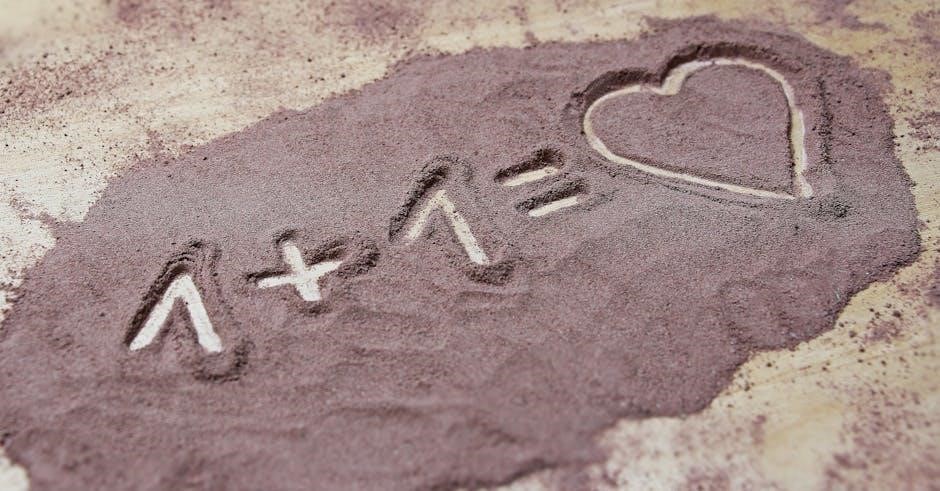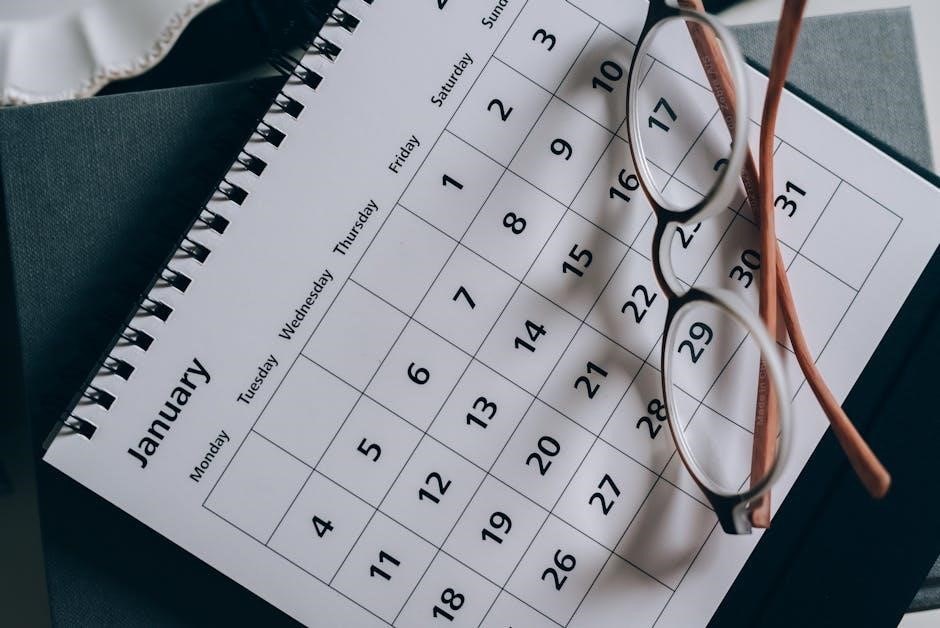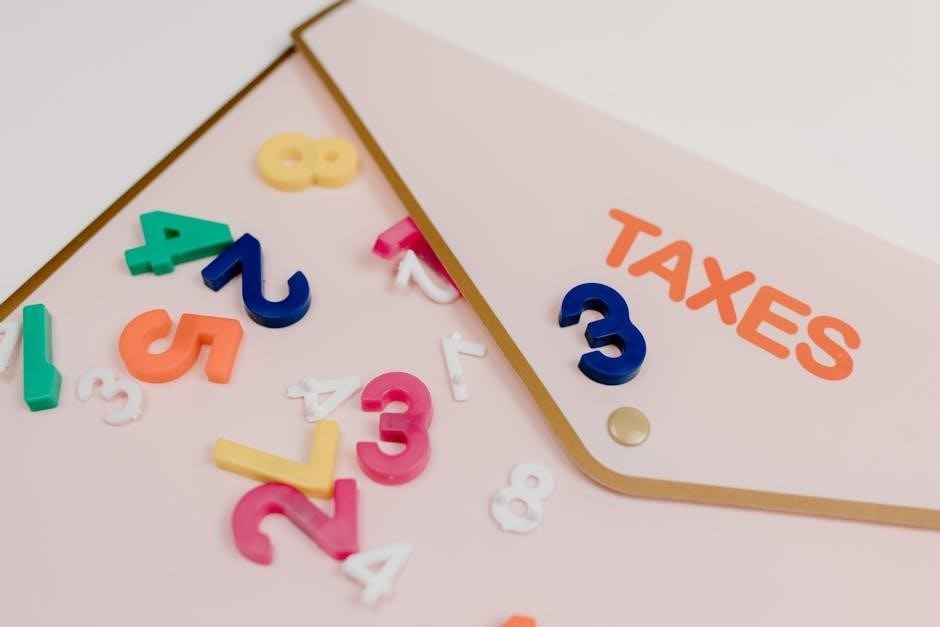Year 1 maths worksheets are educational tools designed to help young learners master basic maths skills. Available as PDFs, they cover topics like addition, subtraction, and counting, providing a fun and structured way to develop foundational maths abilities. These resources are ideal for both classroom and home learning environments.
1.1 What Are Year 1 Maths Worksheets?
Year 1 maths worksheets are educational resources designed for young learners aged 5-6 years. These structured activities cover basic maths skills like addition, subtraction, counting, and number recognition. Available as PDFs, they are easy to download and print. Worksheets often include visual aids and interactive elements to engage children. They provide a simple, clear format for practising essential maths concepts, making them ideal for both classroom and home learning environments. Parents and educators use these tools to support early maths education and build a strong foundation for future learning.
1.2 Importance of Using Worksheets for Early Maths Learning
Using Year 1 maths worksheets is crucial for early maths learning as they provide structured, engaging activities that build foundational skills. Worksheets help children develop problem-solving abilities, hand-eye coordination, and logical thinking. They also enhance concentration and confidence in maths. Regular practice with worksheets improves retention of concepts like counting, addition, and subtraction. Additionally, worksheets offer a visual and tactile learning experience, making maths more accessible and enjoyable for young learners; They are a valuable tool for both teachers and parents to support early maths education effectively.

Benefits of Using Year 1 Maths Worksheets

Year 1 maths worksheets offer numerous benefits, including improved maths skills, enhanced problem-solving abilities, and better academic confidence. They provide structured practice, making learning fun and effective for young students.

2.1 Developing Basic Maths Skills
Year 1 maths worksheets are instrumental in building foundational maths skills. They focus on addition, subtraction, counting, and place value, providing structured practice. These exercises help children understand number relationships and improve accuracy; Worksheets often include visual aids like number lines and counters, making abstract concepts more tangible. Regular use enhances problem-solving abilities and prepares students for more complex maths in later years. By reinforcing basic skills, worksheets lay a strong foundation for future academic success in mathematics.

2.2 Enhancing Cognitive Development
Year 1 maths worksheets play a vital role in enhancing cognitive development by fostering problem-solving skills and logical thinking. Engaging with structured activities improves memory, concentration, and mental agility. Worksheets featuring puzzles, patterns, and sequencing exercises stimulate young minds, encouraging critical thinking. These resources also promote hand-eye coordination through tasks like counting objects and colouring by number. By challenging students to think creatively and methodically, maths worksheets contribute to overall brain development, preparing children for more advanced learning in the future.
Key Skills Covered in Year 1 Maths Worksheets
Year 1 maths worksheets focus on essential skills like addition, subtraction, number recognition, counting, and basic multiplication. They also introduce shapes, measurement, and place value concepts, providing a solid foundation for young learners.
3.1 Addition and Subtraction
Addition and subtraction are core skills in Year 1 maths worksheets. These exercises help children understand basic arithmetic operations, using visual aids like number lines and objects. Worksheets often include activities like completing number bonds, solving simple equations, and word problems. PDF resources provide structured practice, ensuring mastery of these fundamental concepts. Interactive and printable formats make learning engaging and accessible for young students, building their confidence in maths from an early age.
3.2 Number Recognition and Place Value
Number recognition and place value are essential skills in Year 1 maths. Worksheets help children identify numbers up to 100, understanding hundreds, tens, and units. Activities include matching numbers to objects or pictures, and filling in missing digits. Place value concepts are introduced through visual aids like blocks or counters. These exercises build a strong foundation for more complex maths, ensuring pupils can read, write, and compare numbers confidently. PDF resources provide engaging and structured practice for mastering these fundamental numeracy skills.
3.3 Counting and Basic Multiplication
Counting and basic multiplication are introduced in Year 1 maths worksheets to build foundational numeracy skills. Worksheets feature activities like counting objects, recognizing number patterns, and simple multiplication tables. These exercises help children understand the relationship between numbers and develop fluency in basic arithmetic. Visual aids, such as arrays and repeated groups, make learning engaging and accessible. Regular practice with these concepts prepares pupils for more complex maths in later years, fostering confidence and a solid numerical understanding.

3.4 Shapes and Measurement
Year 1 maths worksheets introduce shapes and measurement to develop spatial awareness and practical skills. Activities include identifying and naming basic shapes, comparing lengths, and measuring heights using everyday objects. Worksheets often feature visual aids like ruler guides and shape templates to simplify learning. These exercises help children understand the relationship between objects and their surroundings, fostering problem-solving abilities and laying the groundwork for advanced geometry and measurement concepts in later years.

Popular Year 1 Maths Worksheet Topics
Year 1 maths worksheets cover comparing lengths, sorting objects, counting, and telling time. These topics enhance problem-solving skills and provide foundational maths knowledge for young learners.
4.1 Comparing Lengths and Heights
Comparing lengths and heights is a fundamental topic in Year 1 maths worksheets. These activities help students understand basic measurement concepts by using visual aids and real-life objects. Worksheets often include tasks like identifying longer or shorter objects, ordering items by size, and matching lengths using rulers or non-standard measures. This skill enhances problem-solving abilities and introduces learners to basic measurement tools. By engaging with these exercises, children develop a stronger understanding of spatial awareness and mathematical language.
4.2 Sorting and Counting Objects
Sorting and counting objects are essential activities in Year 1 maths worksheets. These exercises involve categorizing objects by shape, colour, or size and counting them to develop number recognition. Worksheets often feature pictures or real-life items, making learning interactive. This skill improves cognitive development by enhancing memory and concentration. It also introduces basic arithmetic concepts, such as one-to-one correspondence, crucial for understanding addition and subtraction. By engaging in these activities, children build a solid foundation for more complex maths skills later on. These exercises are both educational and enjoyable for young learners.
4.3 Telling Time and Understanding Patterns
Telling time and understanding patterns are essential skills in Year 1 maths worksheets. Activities involve identifying times on analogue clocks, such as half-past and quarter-past, and recognizing sequences of shapes or colours. These exercises improve problem-solving abilities and logical reasoning. Patterns help children predict outcomes, while time-telling enhances their understanding of daily routines. Worksheets often include interactive elements, like matching clock faces to digital times or completing repeating patterns. These activities make learning engaging and prepare students for more advanced maths concepts in the future. They are both educational and enjoyable for young learners.

Free Year 1 Maths Worksheets Available Online
Free Year 1 maths worksheets are widely available online in PDF format. These printable resources include addition, subtraction, counting, and colour-by-number activities, making learning fun and accessible for young students.
5.1 Printable Worksheets for Addition and Subtraction
Printable Year 1 maths worksheets for addition and subtraction are ideal for developing foundational arithmetic skills. These PDF resources often feature engaging layouts, with exercises like missing number bonds and simple sums. They cater to various learning styles, incorporating visual aids and hands-on activities to make practice enjoyable. Parents and teachers can easily download and print these worksheets, ensuring that children can practice essential maths concepts anytime, anywhere. Regular use helps build confidence and fluency in basic operations, laying a strong academic foundation for future success.
5.2 Colour by Number Worksheets
Colour by Number worksheets are engaging resources that combine maths with creativity. These PDF files feature numbered areas to colour according to a key, helping children practise number recognition and sequencing. They are ideal for developing fine motor skills and reinforcing basic maths concepts in a fun, interactive way. Colour by Number worksheets are widely available online, offering a vibrant and enjoyable method for Year 1 students to learn and practise essential skills while creating colourful artwork.
5.4 Interactive Word Problems
Interactive word problems are engaging maths exercises designed to help Year 1 students apply their skills to real-life scenarios. These PDF worksheets feature simple, relatable stories or situations that require basic addition, subtraction, or counting to solve. They encourage critical thinking and problem-solving while making learning fun. Popular among educators and parents, these resources align with curriculum standards and provide a structured way for children to practise maths in an enjoyable and meaningful context.
How to Use Year 1 Maths Worksheets Effectively
Use Year 1 maths worksheets by setting clear goals, providing guidance, and offering feedback. Incorporate them into routines, encourage independent practice, and use them for assessment to track progress effectively.
6.1 Incorporating Worksheets into Daily Routines
Incorporate Year 1 maths worksheets into daily routines by setting a consistent schedule, starting with short sessions. Begin with basic topics like counting and number recognition, gradually increasing complexity. Create a quiet, distraction-free workspace to help children focus. Encourage parents or educators to guide and support learners, providing positive feedback. Use these worksheets to reinforce classroom lessons or introduce new concepts. Track progress by reviewing completed sheets, identifying areas for extra practice. Make maths practice a fun, daily habit to build confidence and foundational skills.
6.2 Encouraging Independent Practice
Encourage independent practice by providing Year 1 students with maths worksheets that align with their skill level. Start with short, manageable sessions and gradually increase duration as confidence grows. Use colour-by-number and word problem worksheets to make practice engaging. Ensure clear instructions are given, and be available for guidance while allowing students to work independently. Celebrate progress, no matter how small, to foster a positive attitude toward maths. This approach helps build self-reliance and problem-solving skills, preparing students for more complex concepts in the future.
6.3 Using Worksheets for Assessment
Worksheets are invaluable for assessing Year 1 students’ maths skills. They provide clear insights into understanding of concepts like addition, subtraction, and counting. Regular use of PDF worksheets helps track progress over time, identifying strengths and areas needing support. Teachers can evaluate accuracy, neatness, and problem-solving strategies. These assessments guide targeted interventions and inform future lesson planning. Additionally, worksheets allow parents to monitor their child’s development, ensuring a collaborative approach to learning and improvement. This structured feedback is essential for fostering academic growth in early maths education.
Year 1 maths worksheets are essential tools for early maths development, offering structured practice and assessment opportunities. They support teachers, parents, and students in building strong foundational skills effectively.

7.1 Summary of the Importance of Year 1 Maths Worksheets

Year 1 maths worksheets are vital for building foundational maths skills in young learners. They provide structured practice in addition, subtraction, counting, and number recognition, fostering cognitive growth. These resources enhance problem-solving abilities and prepare students for more complex concepts. Worksheets also serve as effective assessment tools, allowing teachers and parents to track progress. By offering engaging and targeted exercises, Year 1 maths worksheets play a crucial role in creating a strong academic foundation for future success.
7.2 Final Tips for Maximizing Their Use
To maximize the effectiveness of Year 1 maths worksheets, incorporate them into daily routines for consistent practice. Encourage interactive learning by using visual aids and real-life examples. Provide immediate feedback to help students understand their mistakes. Personalize worksheets to suit individual learning paces and interests. Use colour-by-number activities to make learning fun and engaging. Set clear goals for each session and track progress over time. Finally, explore digital tools for interactive practice, ensuring a well-rounded and enjoyable maths learning experience for young students.


